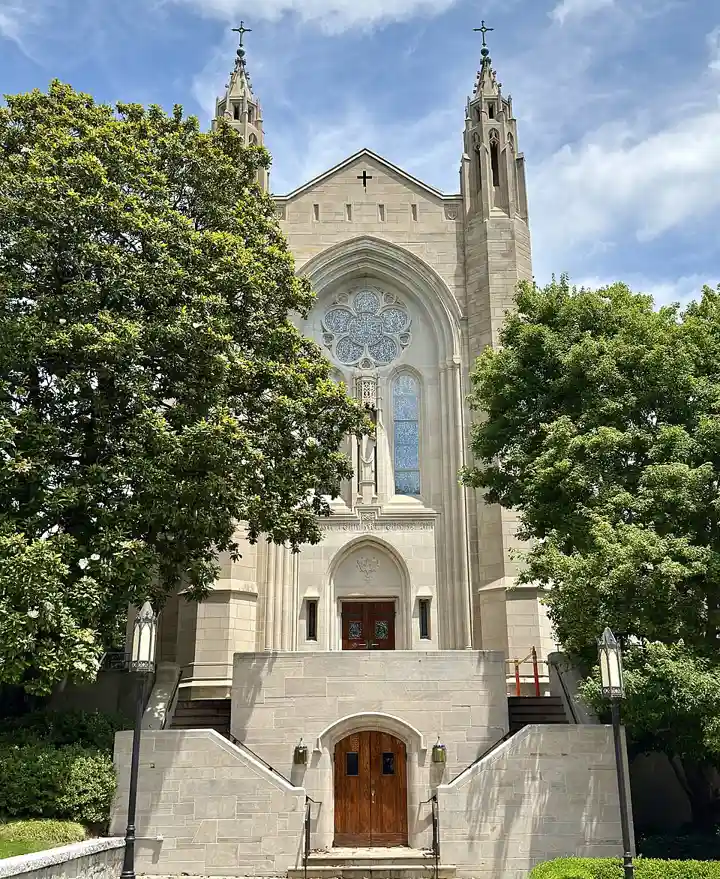Photo: The Cathedral of Christ the King in Atlanta; via Wikipedia.
Twelve men who say they were sexually abused as children by Catholic priests have asked the Georgia Court of Appeals to hold the Archdiocese of Atlanta accountable for what they describe as a decades-long effort to conceal the abuse. According to the plaintiffs, church officials knew priests were sexually abusing children as far back as the late 1970s, yet continued to allow them to work around minors and even encouraged young boys to serve as altar boys under their supervision, Megan Butler of Courthouse News Service reported today.
The case centers on allegations that Saint Joseph’s Catholic Church and the broader Archdiocese were aware that priests assigned across the country had histories of abuse but engaged in a “systematic cover-up effort” to protect the institution. The Archdiocese of Atlanta contends the men’s claims fall outside Georgia’s statute of limitations. Under state law, survivors of child sexual abuse must file suit within two years of turning 18.
“What did he do in those 36 years? What did any of these plaintiffs do in the decades between?” an attorney for the Archdiocese asked the court. “These plaintiffs did nothing,” she said.
The plaintiffs argue they had no way of knowing that church leadership was aware of the abuse until November 6, 2018, when then-Archbishop Wilton D. Gregory released a list naming priests with “credible” allegations of abuse dating back to 1956. Among the names was Father Douglas Edwards, who allegedly molested several boys at his lake house and worked at nine different Catholic churches over the years.
One of the plaintiffs wrote in his complaint that the public release of the list retraumatized him: “This recent discovery of the truth of the Archdiocese of Atlanta’s decadeslong cover-up of the grave problem of its priests sexually abusing parishioners throughout the state of Georgia tore open old wounds, ripped apart old scars and traumatized Plaintiff all over again.”
This is the second time the case has reached the Georgia Court of Appeals. A previous ruling dismissed the claims, asserting that even if the church concealed its knowledge of dangerous priests, the plaintiffs did not demonstrate “reasonable diligence” in pursuing their claims because they already knew the identity of their abuser.
However, the Georgia Supreme Court disagreed and ruled that the plaintiffs could introduce evidence of fraud by the Archdiocese to potentially toll, or pause, the statute of limitations on their claims. Specifically, the high court said they could argue that the church failed in its duty to supervise priests and protect children from harm.
Despite this ruling, a trial court once again dismissed the case, stating that the men failed to prove any “affirmative act” of deception that would have prevented them from taking action earlier. One of the plaintiffs’ attorneys responded, “The lack of disclosure is all that matters.”
During Thursday’s hearing, the panel of judges questioned how survivors of childhood sexual abuse could have reasonably discovered the church’s alleged role in the abuse. “How would that play out practically?” asked one judge. “What would reasonable diligence be when trying to get the church to disclose what they know?”
The church’s legal team said the plaintiffs should have started investigating sooner. The plaintiffs’ attorney countered that the Archdiocese had actively concealed the abuse by transferring priests from one church to another, making it harder to trace patterns of misconduct or find out about past allegations.
Another judge on the panel pointed out that even if the plaintiffs knew about their individual abuser, that does not necessarily mean they were aware of the church’s role in facilitating or concealing the abuse.
Just months before Archbishop Gregory released the list of credibly accused priests, Georgia lawmakers attempted to expand the statute of limitations for child sexual abuse lawsuits. However, amid intense lobbying efforts by the Archdiocese and the Boy Scouts of America, the bill was significantly weakened and failed to pass in its original form.
If you or someone you love is a survivor of clergy sexual abuse, you may have legal options. SurvivorsRights.com may help connect you with an attorney who specializes in abuse cases and has a track record of holding institutions accountable. Learn more about filing a lawsuit against the Catholic Church.
You can also start your free case review by filling out the form below.




